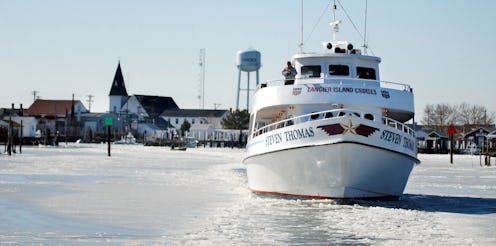
Although it has been one of the U.S. Coast Guard’s long-held missions, you might not know many details about their efforts to protect our environment. Since the early 1800s, the Coast Guard has been devoted to preserving our nation's maritime environment, from protecting marine life and mineral resources within our territorial seas to safeguarding protected marine zones. Whether they're policing the abuse of our waterways, cleaning up after marine disasters like oil spills, or enforcing local and international laws, this branch of the military has played a huge role in protecting our most precious natural resources.
To help uncover the context behind these missions, we've partnered with the U.S. Coast Guard on a quick digest of its environmental efforts. In many ways, the Coast Guard has evolved to meet the challenges of our modern world, enforcing laws that help prevent oil, invasive species, or other hazardous substances from entering our waters. And while emergency response is a huge part of their work, they've taken great strides to ensure that these dire events never occur in the first place.
Read on to discover the tireless work that the Coast Guard does to ensure our nation's shorelines are preserved for all to enjoy — for years to come.
1. They Stop Pollution In Its Tracks
The Coast Guard monitors our shores and other waterways to halt pollution where it's happening. They're tasked with ensuring that all ships (both from the United States and abroad) are complying with domestic and international laws. If they suspect that a vessel is polluting our waters, they can start an investigation and detain the vessel. They also work with contacts at local ports to ensure that marine debris (like discarded fishing gear) doesn't enter our waters.
Fast Fact: On an average day, the Coast Guard investigates 35 pollution incidents.
2. They Clean Up After Unforeseen Disasters
This is a mission that combines Coast Guard's ability to respond to emergencies with its long-held duty to the environment. The Coast Guard works closely with federal agencies like the Environmental Protection Agency to respond to ecological disasters, from illegal dumping to catastrophic oil spills.
Fast Fact: You're probably well-aware of the Exxon Valdez spill of 1989, during which 11 million gallons of crude oil entered Alaska's Prince William Sound. What you might not know is how instrumental the Coast Guard was in the recovery efforts. The Coast Guard coordinated the response, closing the port to traffic, assessing the damage, and working with other federal agencies to expedite cleanup. While it remains a dark spot on our nation's environmental record, it signaled a historic effort from the Coast Guard and led to legislative change — including the passage of the Oil Pollution Act (OPA) and authorization of funding via the Oil Spill Liability Trust Fund in 1990.
3. They Help Clear The Way For Scientific Study
Many people are attracted to serving in the Coast Guard, and enrolling in the Coast Guard Academy, for the opportunity to pursue a hands-on career in marine and environmental science. The Coast Guard is tasked with managing and protecting marine resources and is constantly testing new technologies to ensure that they're prepared for future threats to our waterways. The U.S. Coast Guard Research and Development Center, located in New London, Connecticut, is a research hub for all of the Coast Guard's missions, including environmental protection and maritime law enforcement.
Fast Fact: Ice-breaking vessels help clear the way for other ships in emergency situations and make waters navigable for scientific research and commerce. The Hollyhock, pictured in the background above, did that duty for the huge, 1,013-foot, Great Lakes-based Paul R Tregurtha as it navigated the St. Mary's River.
4. They Protect Marine Life From Harm
Today, the Coast Guard focuses heavily on preventing overfishing and poaching in the U.S. Exclusive Economic Zone, or EEZ. The EEZ encompasses the coastlines of the 48 contiguous states, Alaska, Hawaii, Puerto Rico, and the U.S. Virgin Islands, along with some islands in the Pacific. Overfishing in particular is a severe problem — according to estimates from the U.N., more than three-quarters of the world's fish stocks are either fully tapped out or disappearing at a faster rate than they can recover. The Coast Guard works to enforce laws and patrol areas in which overfishing, whaling, or poaching is occurring.
Fast Fact: The Coast Guard's work in protecting marine life began in the late 1700s, when it enforced laws relating to the whaling and sealing industry.
This post is sponsored by the U.S. Coast Guard.